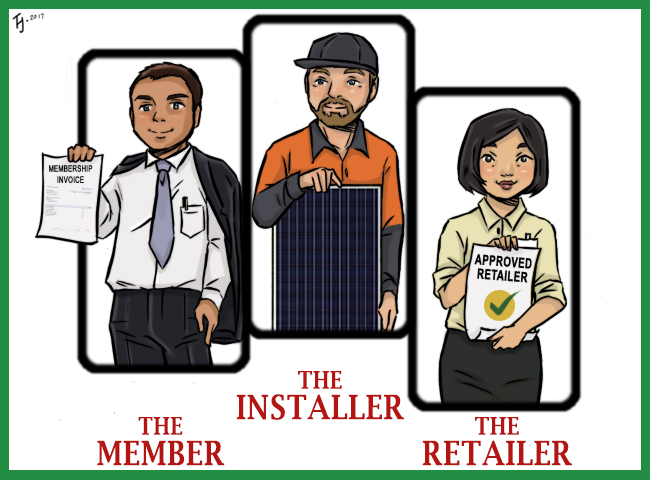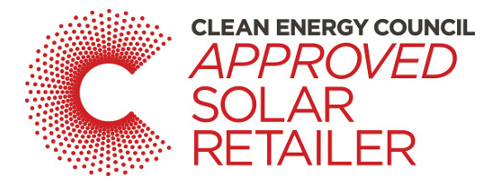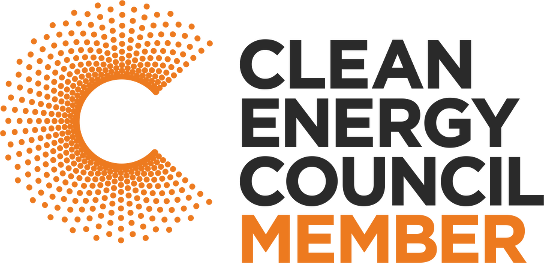
The CEC has 3 levels of affiliation, members, installers and approved retailer. What is the difference?
The Australian Clean Energy Council, or CEC, is Australia’s peak body for solar and other renewable energy.
Update 4th December 2023: The CEC Approved Retailer Scheme was replaced by the NETCC Approved Seller Program on the 1st of February 2023 and you can read about it here. In case you were wondering, NETCC stands for New Energy Tech Consumer Code.
While peak body may sound like a Kosciuszko1 corpse, it is a national, non-profit, trade association group that helps regulate the clean energy industries.
While there are occasional grumbles about how the CEC isn’t quite perfect (*cough*, the 133% rule, *cough*,) they have done a lot for solar in this country and renewable energy in general. We’re really quite fortunate compared to countries that lack such a well regulated solar industry such as the United States or even Canada.2
Whenever rooftop solar is installed in this country, the person in charge of the actual work on site has to be a Clean Energy Council Accredited Installer. The only way the STCs (AKA solar rebate) that lower the cost of rooftop solar can legally be claimed is if an accredited person is on the job and signs off on it3
But installer accreditation isn’t the only qualification or title the CEC regulates and this is where confusion can set in, because not many people know, or care about, the difference between a CEC Accredited Installer, a CEC Accredited Designer, a CEC Approved Solar Retailer, or a CEC Member.
I wasn’t clear on the difference myself before I spent a few hours4 researching this article.
CEC Accredited Installers

This badge can only represent a person who is an installer, not a company.
Any person in charge of installing solar on your roof has to be an accredited CEC installer. If they’re not, then any system they install (or supervise the installation of) won’t be able to receive the STCs that lower the cost of rooftop solar as part of Australia’s Renewable Energy Target (RET). Most people refer to this as the “solar rebate”. Because anyone whacking solar on roofs would soon go broke if they tried to compete without receiving STCs, you can be very certain your installer is legit. But if you want to be sure, you can go to this CEC page and enter the installer’s details to find out if they are one of the over 4,000 the CEC has accredited.
Becoming A CEC Accredited Installer Is Hard Work
To become an accredited installer there are a number of hoops to jump through, or possibly carefully navigate while using proper safety precautions and equipment, since jumping is not permissible behavior when installing rooftop solar.
The steps are:
- Get trained.
- Apply for provisional accreditation: This will require training certificates, an electrical licence, working at heights certification, and public liability insurance of at least 5 million dollars.
- Become a full member after having your work inspected.
- Maintain accreditation by performing a required amount of training each year to keep up to date on new developments.
As you can imagine, achieving all that is not an easy task and is just one of the reasons why accredited installers expect to be paid for their work, despite the fact most of them are pretty enough to get by on their looks.
CEC Accredited System Designers
An accredited installer either oversees the installation of a rooftop solar system or, far more often, gets their hands dirty working on it themselves. Very few can afford to stand around and only supervise.
If you want to work in the solar industry but have such a crippling fear of heights the thought of wearing platform shoes give you nightmares, or you are quite sensibly opposed to any physical effort beyond the absolute minimum required for health, safety, and reproduction, or simply are not a qualified electrician, then becoming a CEC Accredited System Designer may appeal to you.
A system designer, surprise surprise, designs solar systems. Their duties include ensuring every aspect of a system meets CEC system design guidelines. This includes:
- Ensuring safety, both for the people installing the system and those in the building it is placed on top of.
- Providing all required documentation, including information on any shading issues and an estimate of what the system’s output will be, including an estimate of average daily production for every month of the year.
Many accredited installers are also accredited designers, in much the same way that Clark Kent is both a journalist and a Rotarian.
There Is No Such Thing As A CEC Accredited Business
The CEC only accredits individual people as installers and designers. There is no such thing as a CEC accredited company. If you ever come across a business that claims to be one, be very wary. At best they are confused, but it is more likely they simply have no problem lying to make their business sound better and more reputable. And if you think a liar is going to stop at just one lie, well, in that case, you should know I am the world’s second greatest lover and I own a bridge I am sure you’ll will want to buy.
However, just to make things confusing, there are such things as Clean Energy Council approved companies and these are known as CEC Approved Solar Retailers.
A CEC Approved Retailer Is A Clean Energy Council Approved Company

A company can apply to become a CEC Approved Solar Retailer.
Companies that are willing and able to stick like glue to a strict code of conduct and pay the required fees can become a Clean Energy Council Approved Solar Retailer.
This is very different from an accredited installer. While there are over 4,000 accredited installers in the country, there are currently only 43 CEC approved retailers. You can see the entire list of them here.
Update by Finn, October 2020: Since this post was written, the Approved Solar Retailer scheme has become defacto mandatory in VIC and SA, and the percentage of companies being rejected has plummeted. There are now over 1,000 Approved Solar Retailers, including one that I personally consider Australia’s worst solar company, and plenty of ones I would not recommend to a friend. To cut a long story short, by working with state governments to make their scheme defacto mandatory they’ve had to be less fussy about who they let it, and I consider the badge to be almost worthless. Which is a shame. The CEC snatched defeat from the jaws of victory.
The reason why there are so few is that the standards are so very high and the fees are so very not low. The good news is, if you use a CEC approved retailer for your solar installation you can be almost completely sure they will do an excellent job. If they don’t do a good job and the CEC agrees that they have breached the approved retailer code of conduct, they can and will lose their status as an approved retailer.
However, if you do have a problem the CEC says they won’t help you out with getting the problem resolved. They’ll just tell you to go to your local consumer tribunal. So while they will set standards, the CEC doesn’t want to get hands-on involved with complaints involving their approved retailers. I think this is unfortunate.
Update 22nd July: The CEC has contacted me and told me while they don’t have the jurisdiction or resources to intervene in disputes that don’t involve breaches of their code of conduct, they do work behind the scenes to, “facilitate the resolution of disputes”.
How To Become A CEC Approved Retailer
To be a CEC approved retailer, companies have to:
- Sign and follow the code of conduct.
- Pay fees which will vary from around $800 to $6,000 a year, depending on the size of the company.
- Do the paperwork required to show compliance with required procedures and policies.
- Stay golden, stick to industry best practice, and don’t screw up.
All this is not easy and accounts for why there are so few CEC approved retailers around.
Another reason why there are so few is it’s probably easier for medium and large organisations to meet the requirements, which means many smaller installation companies may not think it is worth the effort of applying. It’s certainly not for those who dislike paperwork and can’t afford to pay someone else to do it.
Update 22nd July: The CEC has told me they consider the fees CEC Approved Retailers pay are well worth it and while companies do need to get their paperwork in order, “…we feel that your reference to excessive paperwork is unfounded.”
CEC Members

A company can become a CEC Member by paying the membership fee. If they act really badly they can get kicked out or have their membership application disapproved, but I believe that is a rare occurrence.
The final horse in the Clean Energy Council’s stable of classifications are CEC Members. And from the point of view of Australians looking to put solar on their roofs, they are the least important.
For a start, membership doesn’t mean much. Any company that is “willing to support the work of the Clean Energy Council” can join. This includes your local glue factory, if they are so inclined. After all, recycling horses can be environmentally orientated.
The only real requirement is paying the yearly fee. As a result there are a couple of companies who are members I would not recommend using, so it’s not really an indicator of quality, although if you act reprehensibly they will kick you off.
Your Installer Will Be CEC Accredited, CEC Approved Retailers Are Good, Don’t Worry About CEC Members
The subheading above this sentence sums things up pretty well.
One of the people working on your rooftop solar installation will be a CEC Accredited Installer. If not, then you are dealing with an extremely dodgy company that is engaging in fraud by illegally applying for STCs. Fortunately, this very rarely happens these days. If you are worried you can check to see who is an accredited installer.
A CEC Accredited System Designer will plan out your system, ensuring it meets all Australian Standards and CEC guidelines. Often they are also an accredited installer. When buying solar, you should always get a design document signed off by a CEC accredited system designer.
CEC Approved Retailers meet high standards of conduct and can be relied upon to perform high quality installations.
CEC Members are companies that have paid their membership fees, and have not behaved so reprehensibly that they have been booted out or not had their membership approved. So in my opinion, CEC Membership alone isn’t much of a filter when selecting a solar company.
** Updated on 7th July to tighten up the wording so as not to imply that the CEC is responsible for setting Australian Standards. Standards Australia set the Australian Standards and the CEC issue education and guidelines that help promote those standards.
Footnotes
- Mount Kosciuszko facts: 1. Australia is unique in being the only continent where it is possible to accidentally walk up the tallest mountain. (2) When they discovered that Mount Townsend was higher than Kosciuszko they swapped the names so it was still the tallest. (3) There are two Mount Kosciuszkos in Australia and they are both located in exactly the same place. One is pronounced correctly, while the other makes Polish people cry. ↩
- The rumours about Canada not having sunshine are almost entirely, sort of, untrue. ↩
- Just to be clear – there can be non-accredited persons helping with the installation. The accredited installer is allowed to leave the site and come back again. But the accredited installer has to be there at the beginning, has to supervise the work, has to personally commission the system and has to sign off on it on-site after commissioning. ↩
- I mean days. I spent a few days researching this article boss. I also ran up quite an expense account. You’d be surprised how much information was only accessible by yacht. ↩

 RSS - Posts
RSS - Posts



Interestingly, Euro Solar had their CEC membership revoked earlier this year.
I heard a report that the Australian Solar Council also took similar action.
A fact not well known Ron is that every CEC standard license holder, whether a system installer or designer, relates to Solar PV work and/or design only; and there are a total of 4517 CEC licence holders as of 4th July Australia wide.
Additionally there are a maximum of 4 supplementary technologies endorsements available for CEC licencees who have completed other formal qualifications under the Australian Government Electro-technology Training Scheme, that entitles them to design and/or work on systems involving other energy sources as well as Solar PV including: (1) Micro Hydro Generation (2) Wind Generation (3) Hybrid Systems (4) Energy Storage; and there are a total of 22 CEC licence holders with all 4 endorsements as of 4th July Australia wide.
This is a surprisingly low number considering the very many opportunities (mainly rural understandably) for STC’s creation for small scale ‘Solar PV and Pumped Hydro plus Storage’ in particular.
Lawrence Coomber
Given all of the above, how are people like ‘Modern Solar’ permitted to do solar power installations?
Unfortunately the CEC won’t help you in any way if one of the CEC accredited system designers, let’s say, gets things ‘wrong’. I have been able to clearly demonstrate that we have not been told about a major shading issue (you can also see that on the contract); the reply from them: “is the monthly generated estimation within the +/- 20%? It was -19% at the time if I can recollect correctly.
Should check again as it is coming up to 1 year since installation.
Take away point; just because you have guidelines doesn’t mean you end up a) with a good solution and b) with anything more than a piece of worthless paper.
This is the usual nightmare of government interference in issues that they don’t do much good at [remember NBN? ]. An electrician can work on anything from domestic power points to major and complex engineering installations but be can’t install a solar system,– RUBBISH!. The fees are astronomical, the courses needless and the end consumer pays
I wonder how a retailer is able to be CEC approved that does not list their CEC qualifications on their website. And apparently has no one with a CEC approval?
CEC Solar retailers are required to have as an employee an accredited solar designer on staff as an employee, not a contractor. They aren’t enforcing this. Therefore CEC retailer costs is just a waste of money and slants toward the big money.
Do you require CEC accreditaion to do repairs to existing solar installations ?..and why would you bother to get accredited if you don’t ?
Update: Here is information on the rules for making additions, alterations, and repairs to solar:
https://support.solarquotes.com.au/hc/en-us/articles/360001755676-Summary-of-Rules-for-Solar-Additions-Alterations-Repairs-Upgrades
Any electrician can install and repair solar. Accreditation is about the money from the government.
CEC accreditation
I find it very difficult to navigate CEC membership listings for accredited installers.
I type in names nothing happens. The best I get is a map with hundreds of icons to go through.
An alphabetical list would be better or a yes or no answer.
So I’ve seen some ads & what look like some good deals where the advertiser says they are members of CEC but how to validate if I haven’t the current ability to navigate the CEC website.
DJ Solar & Astra Solar are 2 ads I was going to follow up on as they offered Tier 1 Panels & approved inverters if membership checked out & they have some good reviews.
Thanks
Michael
Hi Michael
I’m afraid it is confusing. All installers will be CEC accredited, as it’s a requirement to do the job. There was an approved CEC Retailer scheme, but that has been replaced by the CEC New Energy Tech Consumer Code program. Here is the CEC page on it:
https://www.cleanenergycouncil.org.au/consumers/buying-solar/find-an-approved-solar-retailer
To find a good installer, I recommend checking their online reviews. If a reviewer says they have a problem but the installer responded quickly and fixed the problem that’s a good sign. I also recommended getting quotes through us, as we will only refer installers to you that have been personally vetted by my boss, Finn, and that we know do high quality work. Just go to this page here…
https://www.solarquotes.com.au/quote/start/
…and enter your postcode and answer the questions that come up as best you can. We also back up the installers we refer with our Good Installer Guarantee:
https://www.solarquotes.com.au/installation-guarantee/